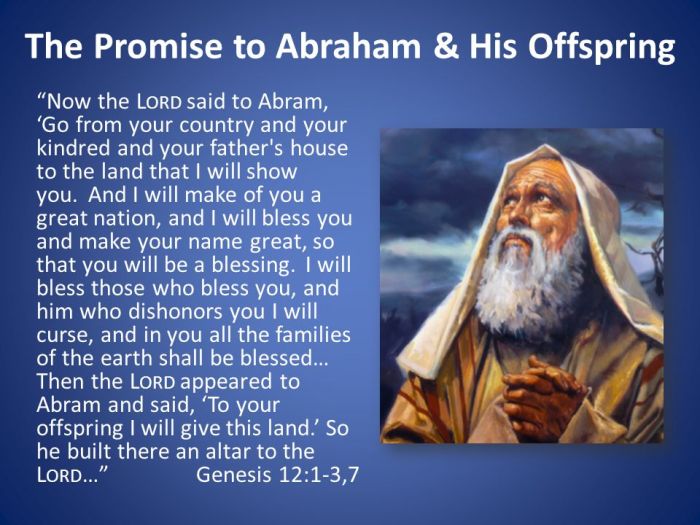God’s Promise to Abraham Worksheets delve into the profound biblical narrative that shaped the course of history. This captivating topic offers a unique opportunity to explore the nature of faith, covenant, and the enduring legacy of God’s faithfulness.
The biblical account of God’s promise to Abraham, found in Genesis, serves as a cornerstone of both Judaism and Christianity. Through these worksheets, students will engage with the historical, theological, and personal implications of this pivotal event.
Introduction to God’s Promise to Abraham: God’s Promise To Abraham Worksheets

The promise made by God to Abraham holds immense significance in biblical history and theology. It forms the foundation of the Abrahamic covenant, which established a special relationship between God and Abraham and his descendants.
The promise was first revealed to Abraham in Genesis 12:1-3, when God called him to leave his homeland and journey to a new land. God promised to make Abraham a great nation, bless him, make his name great, and make him a blessing to others.
Additionally, God promised that through Abraham, all the nations of the earth would be blessed.
Biblical Context
The promise to Abraham is central to the narrative of Genesis and is mentioned throughout the Old Testament. It is seen as a covenant between God and Abraham, a binding agreement that established a special relationship between them. The promise was passed down through Abraham’s descendants, including Isaac, Jacob, and the twelve tribes of Israel.
Historical Background
The promise to Abraham is believed to have been made around the 20th century BCE, during the patriarchal period of biblical history. Abraham lived in a nomadic society in Mesopotamia, and the promise to him reflected God’s plan to establish a new nation through his descendants.
The Content of God’s Promise

God’s promise to Abraham was a comprehensive covenant that encompassed various aspects of his life and future generations. It consisted of several key terms and conditions:
The promise primarily centered on Abraham’s descendants. God declared that Abraham’s descendants would become a great nation, as numerous as the stars in the sky and the grains of sand on the seashore (Genesis 15:5). This promise signified God’s intention to establish a chosen people through Abraham’s lineage.
Land Inheritance
In addition to the promise of descendants, God also promised to give Abraham and his descendants the land of Canaan as an inheritance. This land, located in the eastern Mediterranean region, was to be a permanent possession for Abraham’s people (Genesis 12:7).
Blessings and Responsibilities
The promise to Abraham also included blessings and responsibilities. God promised to bless Abraham and his descendants with prosperity, protection, and guidance. In return, Abraham was expected to live a life of faith and obedience to God’s commands (Genesis 12:1-3).
The Fulfillment of God’s Promise
The fulfillment of God’s promise to Abraham has been a complex and ongoing process that spans centuries. The promise was first given to Abraham in Genesis 12:2-3, where God promised to make him a great nation, bless him, and give him a land.
The first partial fulfillment of the promise came with the birth of Isaac, Abraham’s son. Isaac was born to Abraham and his wife Sarah when they were both very old, and his birth was a miracle. Isaac became the father of Jacob, who in turn became the father of the twelve tribes of Israel.
The establishment of Israel was another major step in the fulfillment of God’s promise to Abraham.
The ongoing implications of the promise for future generations are significant. The promise of a land was fulfilled when the Israelites conquered the Promised Land under the leadership of Moses. The promise of a great nation was fulfilled when the Israelites became a powerful kingdom under the rule of David and Solomon.
The promise of blessing has been fulfilled in many ways, including the spiritual blessings that come from being in a covenant relationship with God.
Theological Implications of God’s Promise
God’s promise to Abraham holds profound theological implications that shape our understanding of the nature of God and its significance for Christian faith and practice.
God’s Nature
The promise reveals God’s faithfulness and covenant-keeping nature. Despite human unfaithfulness, God remains committed to fulfilling his promises. The promise also demonstrates God’s love, as it was given freely to Abraham and his descendants.
Christian Faith
The promise provides a foundation for Christian faith. It establishes God as the initiator of salvation, who takes the initiative to establish a covenant relationship with humanity. The promise also points to Jesus Christ as the ultimate fulfillment of God’s plan, through whom all nations will be blessed.
Christian Practice, God’s promise to abraham worksheets
The promise has practical implications for Christian practice. It calls us to live in faith, trusting in God’s faithfulness even when circumstances seem challenging. It also encourages us to be agents of God’s blessing to others, sharing the promise of salvation with all nations.
Worksheet Activities

To engage students with the topic of God’s promise to Abraham, various activities can be designed to promote understanding, critical thinking, and personal reflection. These activities may include:
Discussion Questions
– Encourage students to discuss the significance of God’s promise to Abraham and its implications for the history of faith. – Facilitate a debate on the theological implications of God’s promise, considering different perspectives and interpretations. – Guide students to reflect on the personal implications of God’s promise, exploring how it relates to their own lives and faith journeys.
Research and Analysis
– Assign students to research the historical context of God’s promise to Abraham, examining the cultural and religious background of the time. – Have students analyze the different ways in which God’s promise has been interpreted and understood throughout history, considering the perspectives of various religious traditions.
– Encourage students to compare and contrast the different accounts of God’s promise to Abraham in the biblical texts, noting any similarities and differences.
Creative Expression
– Ask students to create a visual representation of God’s promise to Abraham, using art, poetry, or music. – Guide students to write a personal reflection or devotional based on their understanding of God’s promise, exploring its significance for their own lives.
– Facilitate a role-playing activity where students take on the roles of Abraham and God, engaging in a dialogue about the promise and its implications.
FAQ
What was the content of God’s promise to Abraham?
God promised Abraham numerous descendants, a land inheritance, and blessings for all nations through him.
How was God’s promise to Abraham fulfilled?
The birth of Isaac and the establishment of Israel were significant fulfillments of the promise, with ongoing implications for future generations.
What are the theological implications of God’s promise to Abraham?
The promise reveals God’s faithfulness, covenant-keeping nature, and love, shaping Christian faith and practice.